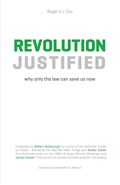Military reports warn that impending energy problems will endanger Western society and threaten to weaken ties between states and their citizens, undermining the very foundations of democracy and the rule of law. Energy issues will also set the stage for more aggressive geopolitics and will substantially destroy the ecosystem services on which society is wholly dependent. These are but a few of the impacts that the double energy problem of climate change and oil decline have in store for us. In this illuminating book, attorney and pragmatic visionary Roger Cox sets out and analyzes these energy stress tests, going on to explain why neither the market mechanism nor today’s political model are capable of initiating an energy revolution to solve these issues. This deadlock situation has the potential to bring about the very downfall of Western society, as this book explains, and will at the very least put Western countries at risk of committing domestic human rights violations on a scale nobody had thought to ever see again after World War II. Precisely this threat of human rights violations puts the judiciary in a position to step in and lead Western governments out of the dangerous deadlock. Drawing and expanding on examples and cases from the US, the UK, the Netherlands, Europe and the European Union, this book demonstrates that the West’s legal systems already contain all the elements needed to achieve an energy revolution faster and more effectively then any other alternative. In his book Revolution Justified Mr. Cox calls for judicial intervention to save the planet and humanity from dangerous climate change. In his opinion governments have become a danger to the wellbeing of society due to their inaction to regulate greenhouse gases. “Our best hope of averting dangerous climate change and breaking the status quo in the energy world is the law”, he poses. In 2013 Mr. Cox issued proceedings against the Dutch government on behalf of the Dutch NGO Urgenda and 900 Dutch Citizens. In June 2015 these proceedings concluded with an unprecedented and groundbreaking verdict in which the District court in The Hague ordered the Dutch government to reduce its CO2 emission by at least 25% in 2020 (compared to 1990 levels). Mr. Cox is now helping to set up a network of NGO’s and lawyers for climate proceedings in other countries. With his help and advice, similar proceedings have already been instituted in Belgium. Next to his (climate) litigation practice, Mr. Cox is heading the real estate, city development, energy and infrastructure practice at the law firm Paulussen Advocaten. Mr. Cox is also founder of the Planet Prosperity Foundation, via which he is promoting the circular economy. The Dutch Green Building Council selected Mr. Cox as one of the most influential people in sustainable real estate development. He is also listed in Trouw newspaper’s Sustainability Top 100. He is a visiting university lecturer, publishes regularly and holds seats at several business councils on sustainable development.

